 |
| Photo by Nick Athanas (Antpitta) |
Common name:
puna miner (en); curriqueiro-da-puna (pt); géositte de la puna (fr); minero puneño (es); punaerdhacker (de)
Taxonomy:
Order Passeriformes
Family Furnariidae
Range:This species is found in southern Peru, south-western Bolivia, northern Chile and north-western Argentina.
Size:
These birds are 15-16 cm long and weigh 22-29 g.
Habitat:
The puna miner is found in high-altitude grasslands and sometimes also in scrublands, at altitudes of 3.000-5.000 m.
Diet:
They feed on the ground, taking insects and other arthropods.
Breeding:
Puna miners nest in a burrow on the ground, with an incubation chamber at the end lined with grasses, feathers and hair. There the female lays 2-3 whitish eggs which are incubated by both parents for about 2 weeks. The chicks are fed by both parents and fledge about 18 days after hatching.
Conservation:
IUCN status – LC (Least Concern)
This species has a large breeding range and is described as uncommon. The population is suspected to be stable in the absence of evidence for any declines or substantial threats.







